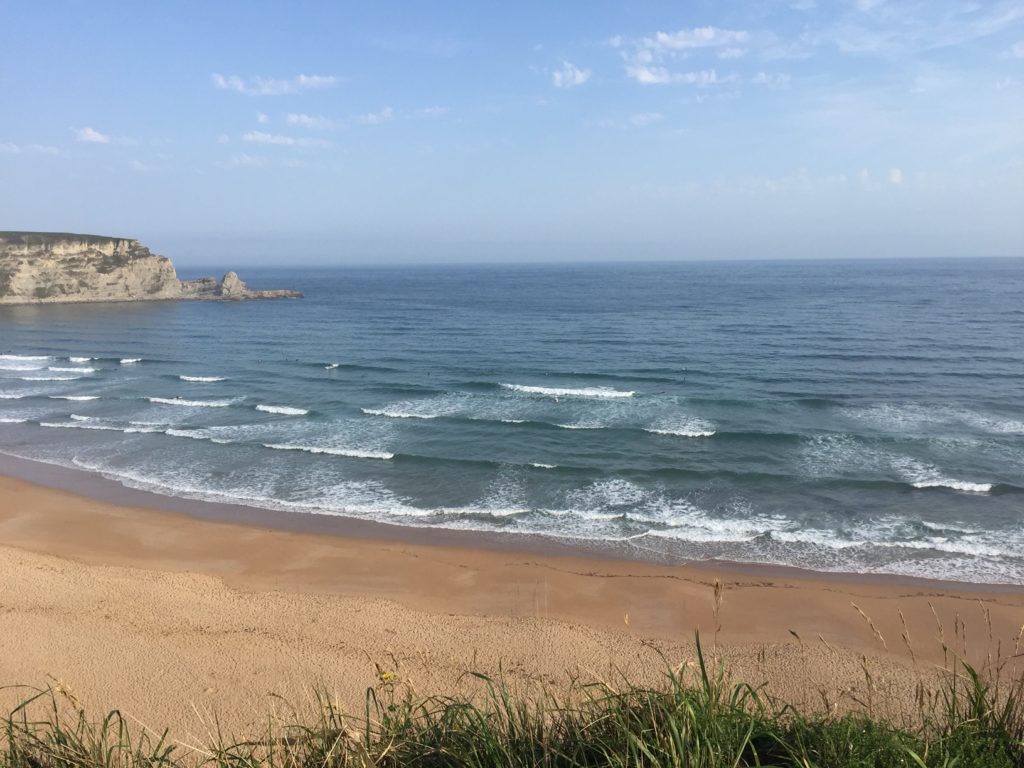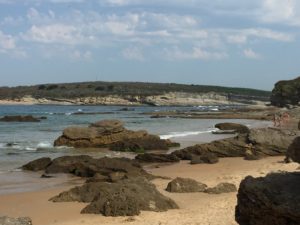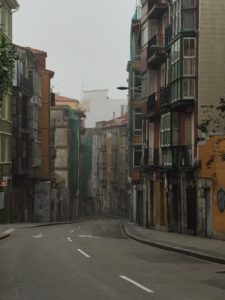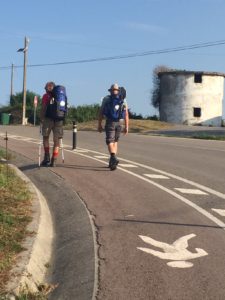buddy system
the days
that bring tears
to my heart
are well spent
 Today, I played. As I hiked along in the morning, if the view was enchanting, I stopped and gave it my full attention. When I passed a cornfield, I remembered running through the rows as a child, so I jogged alongside in my pack and hiking boots, high-fiving the corn leaves. And on a great downhill portion of the trail, with no rocks or peregrinos in sight, I raised my walking stick like a spear, reared back, and charged down the hill like a little child playing warrior, hollering wildly, then grinning and panting as I hiked on.
Today, I played. As I hiked along in the morning, if the view was enchanting, I stopped and gave it my full attention. When I passed a cornfield, I remembered running through the rows as a child, so I jogged alongside in my pack and hiking boots, high-fiving the corn leaves. And on a great downhill portion of the trail, with no rocks or peregrinos in sight, I raised my walking stick like a spear, reared back, and charged down the hill like a little child playing warrior, hollering wildly, then grinning and panting as I hiked on.
 By 10am, the Camino crossed a small beach on its way to steps leading over the next hill. So of course I stopped, stripped down, and waded out into the rocky alcove where the water was sheltered from the fierce waves. I found a perfect shell, and marveled at the black rocks covered in algae. From there, I ventured onto the small beach itself, and jumped and kicked and laughed in the rowdy surf, dropping down to sit under the water, popping up after a wave rolled over my head. The delight of totally solo play is to be totally uninhibited.
By 10am, the Camino crossed a small beach on its way to steps leading over the next hill. So of course I stopped, stripped down, and waded out into the rocky alcove where the water was sheltered from the fierce waves. I found a perfect shell, and marveled at the black rocks covered in algae. From there, I ventured onto the small beach itself, and jumped and kicked and laughed in the rowdy surf, dropping down to sit under the water, popping up after a wave rolled over my head. The delight of totally solo play is to be totally uninhibited.
Refreshed, I got dressed, and as I was toweling off my sandy feet, here came all of my pals tromping by – Pablo, Juan Carlos, Svend, his friend. I called to them to join me, but no one stopped to goof around. I resisted the urge to yell out, “Hike! Hike! Hike!” as they passed.
Too bad. Over the hill, I slogged through loose dunes out to the firm, wet sand of the next beach – beach after beach on the northern coast, and all free. Since this was the actual Camino route, I amused the swimmers and sunbathers, and so amused myself as well, collecting sea shells. This stage of the trek passed quickly, shell by shell, until at the end of the long beach, I clambered up through more loose sand to a boardwalk, sporting a boardwalk cafe. I sat on a wall, my pack leaning heavily against it, and dumped the sand out of my boots as nearby, parents sat their youngsters on the wall to do the same. Boots, pack, and stick in hand, I jogged over the boardwalk to the cafe’s outdoor tables, where I ordered cafe con leche and a sausage and egg pinxcho – my Camino Happy Meal.
A short walk down the boardwalk, I found the embarcadero, and for less than three euros, I got to ride on Scuffy the Tugboat across the Santander bay. Sitting up front, the salty breeze rushed over me as we passed a castle, a huge palace on the hill, and reached our landing right in the center of town. Disembarking, I walked past the cathedral, down a staircase, up another staircase, and found the albergue just a few minutes later, on a tough street of graffiti-covered doors, rusting gates, and crumbling stone walls exposing decaying wooden roof beams.
At 3pm sharp, the equally tough hospitalera opened the door – but only one at a time could enter, boots immediately on the shelf, stick immediately into the tall can, and the price is 12 euros, not 10, no 50-euro bills accepted. Nevertheless – if you smiled and followed her directions, boots here, stick here, cash here, like a strict teacher she would reward you with a smile in return, announcing, “Perfecto.”
The showers were hot, the beds standard-issue metal bunks, the people peregrinos I had met. Perfecto enough.
I looked at one young man closely; slowly, I asked, “What…is your name?”
He grinned a beautiful, foxy smile, answering in a flirtatious tone, “It is me – Saulo-mon!”
“Saulomon! No – you look younger! How can this be?”
“Barbara! You too! You have lost weight – and gained color!”
“Yes,” I said. “And a stick.” I gave him a wink. I told him about my play day.
“Yes, you are becoming 17. Birth-day-par-tee — in San-ti-a-go!” And he gave me a huge hug.
I toured the cathedral, wondering at the Roman ruins underneath, had a glass of vino tinto, bought items at the farmacia, and light, wind-resistant pants for the Primitivo; afterward, I finished all of a fantastic omelette of calamari, mushrooms, prawns, and bacon, a second glass of vino tinto, and of course, fresh bread.
My pizza gut was gone; I was light and lean. I am in Spain, I kept marveling. I am making friends and loving every day. It is almost 7pm, and there are three hours left before the sun sets. So much time. So much time to play.
* * * * * * * * * * * * * * * * *
The kilometers passed more easily with friends. We told each other stories, and the steps went quickly. This morning, I walked until noon with Pablo and Juan Carlos, finding out why they both became policemen, what motivated them. They had known each other since they were 15, and argued and harassed each other accordingly as the stories unfolded.
Pablo had originally followed in his father’s footsteps and drove a cab. The money was good, but something was missing. Always looking for a new horizon, he answered an ad seeking new recruits for the police force, and this huge, straight-forward man was readily accepted – I would assume with outstretched arms. He then recruited Juan Carlos.
Juan Carlos had gone to the university after they graduated high school. His degree: philosophy. So in no time at all, his education rewarded him with a job in a factory. It was a fine job, but police officers were paid more, and so, with persistent nudging from Pablo, Juan Carlos too joined the police force, perhaps with less enthusiasm, but with commitment nonetheless.
It was fun to discuss philosophy with Juan Carlos (who did not speak English) using Pablo as our translator, who I think would have preferred to talk about football, but he indulged us anyway. At Pablo’s urging, Juan Carlos thought to trick me by asking if I agreed with the concept, “The whole is greater than the sum of its parts,” which, I said, I do.
Aha!, he disagreed, illustrating the flaw in this thinking using mathematics, where integers carry a zero (noted .0) that reflects a relationship to infinity, stating that thus, the whole, an infinite number, cannot be greater than the individual, infinite numbers themselves. Poor Pablo.
To which I countered: two people meet and fall in love; what is between them is much more than just one person and one person. In the same way, a flower is beautiful, and two flowers are lovely; but a hillside of flowers will take your breath away. Pablo smiled, amused, as he relayed my words.
Juan Carlos nodded in surprise, mildly impressed, and conceded these points, so I softened my stance by saying, “I am a poet. We are bad philosophers, because we cheat: we see everything as poetry.”
At lunchtime, I walked into the village Boo de Pielagos beside the river Mogro. Father Ernesto had advised that, to cross the river, peregrinos often walked across the train bridge – somewhat dangerous, and illegal, subjecting peregrinos to arrest, but his view was that peregrinos choosing the Camino del Norte were more “creative” than those walking the Camino Frances. I didn’t feel as creative as Father Ernesto might have liked, but I knew that one way or the other, the puente de tren was my ticket across the river.
As I walked the path toward the river, I passed a tiny, elderly woman walking very slowly, carrying groceries home. I offered “buenos dias” as I stepped around her, and she smiled slightly in return. However, a few paces forward, I stopped and walked back to her.
“Necessita ayuda, señora?” I asked in my babytalk Spanish.
“No, perro muchas gracias, peregrina,” she replied.
“Eh, donde es estácion de tren?” I asked.
“Aqui, aqui,” she replied, and, having seen the shell tied to my pack, allowed me to carry her groceries at last, placing her thin hand in the crook of my arm. She led me to the train station, a wayside platform no bigger than a covered bus stop. Her name was Maria Jesus. I would never have found it without her. She gave my arm a squeeze as we parted, adding, “Buen Camino.” I smiled, waving and calling thanks.
At the train platform, I met up with Svend and his friend, whose name was Wolfgang (oh that’s not intimidating, I thought). They were waiting for the train, but had only seen trains passing in the opposite direction. Wolfgang was growing a little impatient. I asked if they had tickets, and they said no. Reading the instructions on a small kiosk, reference was made to loading a card; a free call could be made for assistance.
I pressed the call button just as Wolfgang let me know it wasn’t helpful. A man’s pleasant voice came through a speaker in the fastest Spanish I had heard yet. I asked, in my babytalk, about train tickets, but with the combination of speed and fuzzy sound quality, I had no idea what he said, finally resorting to, “Nada, nada, gracias,” at which point the pleasant voice hung up. Svend and Wolfgang began laughing before I had even ended the call, as they had tried this too; the plan was to try to buy tickets on the train. I did my part by translating the train schedule hanging under plexiglas behind us – we had 45 minutes to wait.
Svend worried that he was out of water, so I offered him some of mine, which he initially refused. I held out both of my still-full water bottles, having emptied only my smallest third bottle, until he finally relented and let me pour some of my water into his bottle. “it will taste a bit metallic,” I explained as I poured. “The iodine makes it clean, though.” So Svend drank. I pulled out peanuts, and shared those as well, and dried apricots, and so began taming my Germans. I felt thrilled, like I had tamed wolves.
When the trained arrived, we all stumbled on, fitting our packs and poles and sticks inside as best we could. We watched the river’s approach, and marveled as we sped overtop. “It’s the first stop, isn’t it, the village Mogro?” Svend and Wolfgang had no idea, and yet, when I hopped off at the next stop, we all got off. No ticket, no cash, no problemo. We had hopped a train. I thought Father Ernesto would be proud. Seventeen-year-old me was – there was no other word for it – stoked.
Thankfully it was correct, and we immediately found our yellow arrows again. So in the afternoon, I got to walk with Svend and Wolfgang. Svend was a paramedic with the Red Cross, and Wolfgang was an editor for an ad agency, and self-employed as well, as a translator. Wolfgang spoke four languages, including an American English that rarely betrayed his native German, and overall, he amazed both Svend and I. They were both married, both fathers, and so we could talk easily about relationships, parenting, grandchildren, and finding meaningful work. We talked of the Camino and its meaning, too, and how the ultimate destination is, of course, death, so the way is, the journey is, all you really have. I told Svend I had come to rely on the guidebook less and on the people more, and he became teary, and we became fast friends on the spot.
I have a soft spot for people who can cry, who can allow their hearts to be touched. I had already begun to have my own teary moments, of wonder and gratitude, even twinges of self-forgiveness for taking so long to get here, for blowing off my dream, for having had cancer and having to give up the soft places in my body where my babies grew, for divorces and bad choices and all the mistakes, all the confusion. In that moment, Svend reminded me that we can access healing tears, like the fonts of holy water at the churches and chapels along the way.
I told them how, last night at the albergue where I stayed, I sat talking with a woman named Aqua for a long time. Aqua was finishing her master’s degree in Dance and Music Anthropology. She taught traditional Lithuanian folk dance in the schools. Aqua reported that, as a result, bullying was reduced, she believed because dancing crossed socio-economic strata, and because the children touched. They joined hands, or held at the waist, and this safe touch changed how they related to each other. It was fun, practicing trust this way.
Aqua had also learned about the Basque social system that gave each Basque person a minimum income that was enough to pay rent, buy food, and visit family to keep their social network firmly connected. So the Basque essentially had no homelessness – because they had enough, and had each other. Trust again. We had talked about homelessness in the U.S. and terrible alcoholism in Lithuania, and what we could learn from the Basque, and from each other.
I told them how Aqua sang a sample of traditional choral music, songs for three voices in a round that traveled minor keys designed to produce a very pleasing dissonance. I liked that each voice could be heard, and added a richness of texture and tone to the overall structure of the songs. Svend is a visual artist, so we talked about my art program for the homeless, and this notion of a pleasing dissonance as visual image, too – contrast, opposition, and the unexpected.
We discussed our Camino guidebooks. I described my English book as written for “peak baggers,” and then needed to explain the term. I suggested Wolfgang should write a new English guide, properly, with realistic daily mileage, and more about its beauty and peacefulness, which, I found out to my surprise, he deeply enjoyed. I would not have guessed this when, taking a photo of an old man working in his garden, I rejoined the walk to Wolfgang’s sarcastic reprimand: “Stealing the souls of the elderly of Spain, are we?” I retorted that I’d asked, but the abuelo couldn’t hear me. Svend smiled broadly, hiking along. I loved them both in that moment.
As Father Ernesto had revealed, the people I had met on the Camino were smart and interesting; they had depth, and curiosity. I had trail buddies. We hopped a train across the river, and made do in cheap albergues, sometimes with cold showers and no kitchens or laundry. Because we got to walk together for hours talking of meaning and purpose, and help each other find our way, making connections even without train tickets, or signs, or yellow arrows. We had each other. We were creating a very pleasing dissonance. It would bring tears to your eyes, if you really listened.

